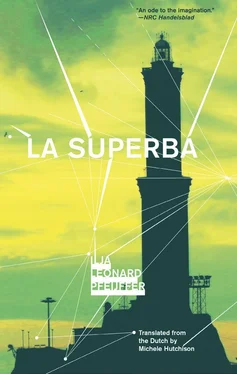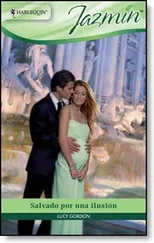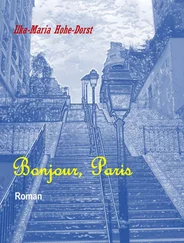And even if the ship made a safe crossing, there was no guarantee that all the passengers would still be alive when it docked. The journey lasted at least a month or, if you were unlucky, longer. Many didn’t survive the terrible conditions in third class. They died of cholera, dysentery, or other illnesses, or simply of hunger, sometimes in the hundreds. There are lists of those, too. I think I copied them as well but I can’t put my hands on them. But perhaps they don’t matter. The lists aren’t important. I want to see the fear in the face of a man who danced and sang at home. I don’t want icebergs or German submarines on the stage, nor crowd scenes with dying passengers. I want to see a person who is afraid. And who clings to hope. I want to see how beautiful that hope is and how unjustified. I want to hear him have whispered nighttime conversations with fellow sufferers, complete strangers, about all the plans they have for the mountains of gold that will fall into their laps at the other end. Those whispered dreams exorcise the fear that can’t be exorcised. The sound of waves. Sound of waves.
24.
And then the arrival. The decor could be Argentina, Brazil, or the United States. I’d certainly choose New York if only because I’ve found the most material about it. But also for dramatic reasons. After more than a month, those who were still alive saw the Statue of Liberty. It was an indescribable sight for our farmer from Piemonte. This was what they’d told him about. In La Merica the women were as tall as mountains and they meant freedom. He hadn’t been able to imagine that. But now he could. Now he could see it. Now he could see it with his own eyes. He actually began to cry, I’ll be damned if it wasn’t true. The crossing had been hellish, but it was all worth it. Everything they’d promised him was true. From a distance he could see the gold shining in the streets. His children would have a better life than he.
And then a hard cut to Ellis Island. In 1892, the Americans had set up an island to process the flow of immigrants from Italy. The first- and second-class passengers were allowed to disembark at the port. Third-class was put into quarantine first, which, given the epidemics onboard ship, could hardly be considered unreasonable. And then the humiliation. The interrogations in English and the medical examination. “Pants off!” Trembling naked bodies in a row who have no idea what is expected of them but who have resolved to do everything expected of them. Single women, even if they were engaged, weren’t allowed into the United States, unless they got married on the spot on Ellis Island. Those Americans had a country to run, and the last thing they needed was a decline in morals; unmarried women would lead to just one thing — prostitution.
I picture a wonderful scene here. A young farmer’s daughter from Lombardy or Emilia-Romagna doesn’t know about the rule. Her fiancé left for New York over a year ago. But to be allowed into the country and be reunited with him, by law she has to marry someone on Ellis Island. She asks our main character. He understands the situation, he gets that it’s just a formality, they marry according to American law, give each other a quick kiss, and then he falls in love with her. The only other woman he’d ever kissed was his wife. No, he’d never even kissed her. They had three children, it was true, but love didn’t count in the village. That was something that belonged to the New World.
And in the final scene, I’d really rub it in. With an oily rag. As greasy as possible. Those mountains of gold that had been promised to him would turn out to be a fata morgana. He would struggle to find work in a steel factory, on the railways, in a mine. He’d work until his vertebrae were worn and his knees broken, he’d earn dollars not lire, but have less to eat than back home in Italy, in his village, yeah, his village, where the bones of his ancestors were buried and his family was waiting. And he wouldn’t be able to forget the woman he’d married for the form on Ellis Island, either. He’d like to buy a gold ring for her if he had any money and knew where to find her.
And at that very moment, someone knocks on his door. A friend. An Italian who speaks the same regional dialect and who says he understands everything. He can help him. He promises mountains of gold.
I think the play should end there, with the renewal of false hope. His initiation into the gang, the crimes, and, finally, the prison sentence would follow accordingly — people get that. It’s a story that never grows old.
25.
Monia kept on calling and texting me. I didn’t answer. I resolutely ignored her. But at a certain moment, in the middle of the day, I had an incoming call from a number that wasn’t recognized. It was a man. “Emergency,” he said. “Emergency. Can you come as quickly as possible? Via Chiabrera. You know. You’re the only person I know who has the keys.”
“Can I ask how you got my number?”
“Your girlfriend, my upstairs neighbor, gave it to me today by coincidence. For emergencies, she said. But an emergency arose right away. I swear, I’d never have dared call you if that wasn’t the case.”
I didn’t much feel like an emergency. And certainly not an obviously staged emergency. And certainly not in Via Chiabrera. I called Monia to find out what was going on. But her phone was answered by a little girl.
“Can I speak to your mother?”
“I don’t have a mother.” The little girl began to cry and hung up. I called back. “Please come, Leonardo,” she said. “Leonardo, please come. I’m drowning here. If you don’t come, I’ll die. I’m drowning.”
What the fuck? What would you do in that situation, my friend? Exactly. I went to check out what was going on in Via Chiabrera. Not out of compassion for what Monia might have come up with to attract my attention, but more as a disaster tourist. I’m your reporter, aren’t I? And if she distorted her voice to imitate a little girl and even called as the neighbor, there could be something picturesque going down that I wouldn’t like to deprive either of us of.
Indeed, I did have a set of her spare keys. I’d wheedled them out of her the previous time. Maybe I didn’t tell you. But you never know, I’d thought then. The downstairs neighbor was waiting for me in front of her door, up the marble staircase after the first gate. He was pulling his hair out. That’s a stupid expression, which I’d never use, only in this case it was literally true.
“Oi, oi,” he said. “Oi oi.”
I understood why he was saying that. Water was gushing down the marble staircase. I waded upstairs. The neighbor followed at a polite distance, as he prayed to various saints as well as the Holy Virgin herself. The last gate was open by default. And after a bit of fumbling, I found the right key to the front door.
“Monia?”
She didn’t reply. I went inside. The neighbor shuffled along quietly behind me. She was in the bath. With all her clothes on. Well, clothes. She was wearing some kind of wedding dress, a white lacy ensemble with a veil. She had on heavy golden rings and necklaces. Her head was safely above water but she was already unconscious. The bath tap was running full force. The flooding had taken on Old Testament proportions.
I turned off the tap and lifted her out of the bath. I pulled out the plug and put her on her bed. She had come to her senses, slightly. “Undress me, Leonardo. I’m your bride. See how pretty I am.” I undressed her. “Oi, oi,” the neighbor muttered. “Fuck me, Leonardo. This is our wedding night.”
Instead of that I went into her study to look for her cleaner’s number. “Emergency?” “Emergency.” As I waited for her, I had a better look around the study. I noticed that I couldn’t see a single piece of mail or any documents that related to any kind of work whatsoever. There was a pile of fashion magazines, a big pile of brochures advertising long-distance travel to exotic places, and an even larger pile of unopened envelopes. I took the liberty of opening a couple. It was an emergency, after all. They were all unpaid bills — with some court injunctions among them. Some already a year old.
Читать дальше












